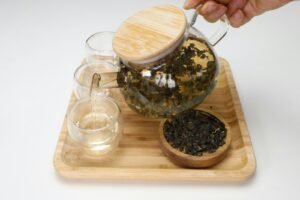Oolong Tea: All You Need To Know

All You Need to Know About Oolong Tea
Oolong tea, often referred to as the “champagne of teas,” occupies a delightful middle ground between green and black teas. This partially oxidized tea offers a complex flavor profile and a host of health benefits, making it a favorite among tea enthusiasts. Let’s dive into everything you need to know about this exquisite beverage.
What is Oolong Tea?
Oolong tea is a traditional Chinese tea made from the leaves of the Camellia sinensis plant, the same plant that produces green and black teas. The key difference lies in its oxidation process, which ranges between 10% and 80%. This unique process creates a spectrum of oolong teas with varying flavors—from light and floral to robust and nutty.
Varieties of Oolong Tea
The type of oolong tea depends on factors like region, processing method, and oxidation level. Popular varieties include:
- Tie Guan Yin: A floral, lightly oxidized oolong with a creamy texture.
- Da Hong Pao: A heavily oxidized, roasted oolong known for its rich, earthy flavor.
- Milk Oolong: A lightly oxidized tea with a buttery, creamy taste, often mistaken for being infused with milk.
Nutritional Value
Oolong tea is a low-calorie drink packed with antioxidants, vitamins, and minerals, such as:
- Catechins and Theaflavins: Powerful antioxidants that protect cells from damage.
- Fluoride: Promotes dental health.
- Magnesium and Potassium: Support heart and muscle function.
Health Benefits of Oolong Tea
Oolong tea offers a range of health benefits, making it not only delicious but also a nourishing choice:
- Boosts Metabolism and Aids Weight Loss
Oolong tea has thermogenic properties that enhance fat burning and metabolism. - Improves Heart Health
Regular consumption may help lower cholesterol levels and reduce the risk of heart disease. - Supports Mental Clarity
The moderate caffeine content in oolong tea provides a gentle energy boost and improves focus without the jitters. - Enhances Skin Health
The antioxidants in oolong tea may reduce signs of aging and improve skin elasticity. - Promotes Gut Health
Oolong tea’s polyphenols support a healthy digestive system and help balance gut bacteria. - Strengthens Bones
Drinking oolong tea over time has been linked to better bone density and reduced risk of osteoporosis.
How to Brew Oolong Tea
Brewing oolong tea requires a bit of care to unlock its full potential:
- Water Temperature: Use water heated to 185–205°F (85–96°C). Avoid boiling water, as it can scorch the leaves.
- Tea-to-Water Ratio: Use 1 teaspoon of loose leaves per cup of water.
- Steeping Time: Steep for 2–5 minutes. Lighter oolongs require shorter steeping times, while darker ones can steep longer.
- Re-steeping: High-quality oolong tea can be steeped multiple times, with flavors evolving with each brew.
Precautions and Side Effects
While oolong tea is generally safe, consider these points:
- Caffeine Sensitivity: Oolong tea contains moderate caffeine. Monitor your intake if you’re sensitive to caffeine.
- Pregnancy: Pregnant women should limit caffeine consumption.
- Iron Absorption: Drinking tea during meals may reduce iron absorption. Enjoy it between meals instead.
Where to Buy Oolong Tea
You can find oolong tea in specialty tea shops, online retailers, and Asian markets. Look for loose-leaf varieties for the best flavor and quality.
Final Thoughts
Oolong tea is a sophisticated beverage with a perfect balance of flavor and health benefits. Whether you’re a seasoned tea drinker or a curious beginner, oolong tea offers an exciting journey of taste and wellness. Brew a cup, savor its nuanced flavors, and let it transform your tea experience.
What’s your favorite type of oolong tea? Share your recommendations and brewing tips in the comments below!

Comments